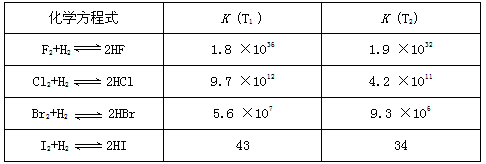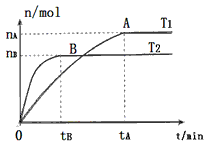在温度T1和T2下,X2(g)和 H2反应生成HX的平衡常数如下表:

(1)仅依据K的变化,可以推断出:随着卤素原子核电荷数的增加,_______(选填字母)
a. 在相同条件下,X2的平衡转化率逐渐降低
b. X2与H2反应的剧烈程度逐渐减弱
c. HX的稳定性逐渐减弱
d. HX的还原性逐渐
(2)在容积为3L的密闭容器中,由I2(g)和H2(g)合成HI(g),在其他条件不变的情况下,研究温度对反应的影响,HI的物质的量的变化情况如下图所示。

①温度为T1时,在0~tAmin内,H2的消耗速率v (H2)=__________
②分析上图所示图像,下列说法正确的是________(填序号)
a.温度为T2,容器内气体密度不变时,反应到达B点所示状态
b.平衡状态从A点移动到B点,n(HI)/n(H2)增大
c.该反应为放热反应
(3)加水稀释0.1mol·L-1的HF溶液,下列各量中增大的是________(填序号)
a. c(H+)
b. Ka(HF)
c. c(F-)/c(H+)
d. c(H+) / c(HF)
(4)在0.1mol·L-1HCl溶液中加入过量AgNO3溶液,产生白色沉淀,再滴加KI溶液,出现黄色沉淀,试写出有关的离子方程式____________ 、_____________ 。
(1)ac
(2)2nA/3tA mol·L-1·min-1; c
(3)d
(4)Ag++Cl-==AgCl↓ ;AgCl(s)+I-(aq)=AgI(s)+Cl-(aq)
